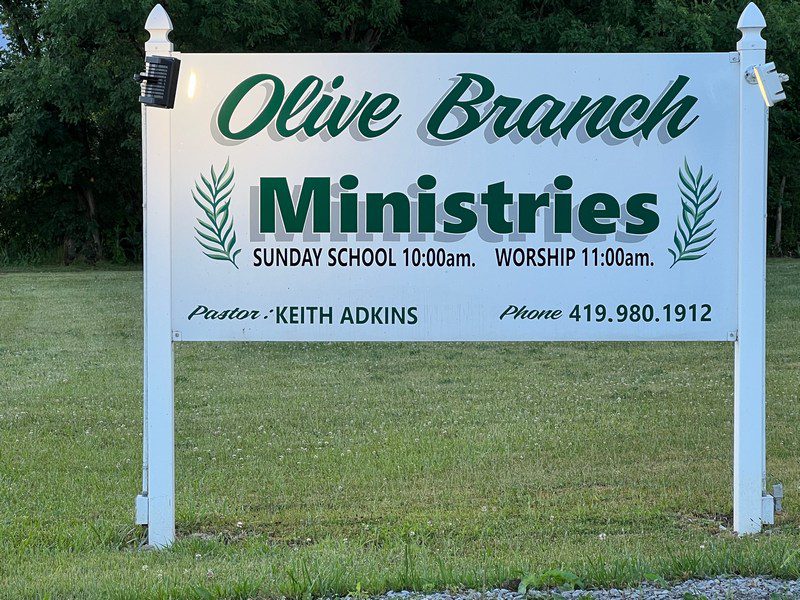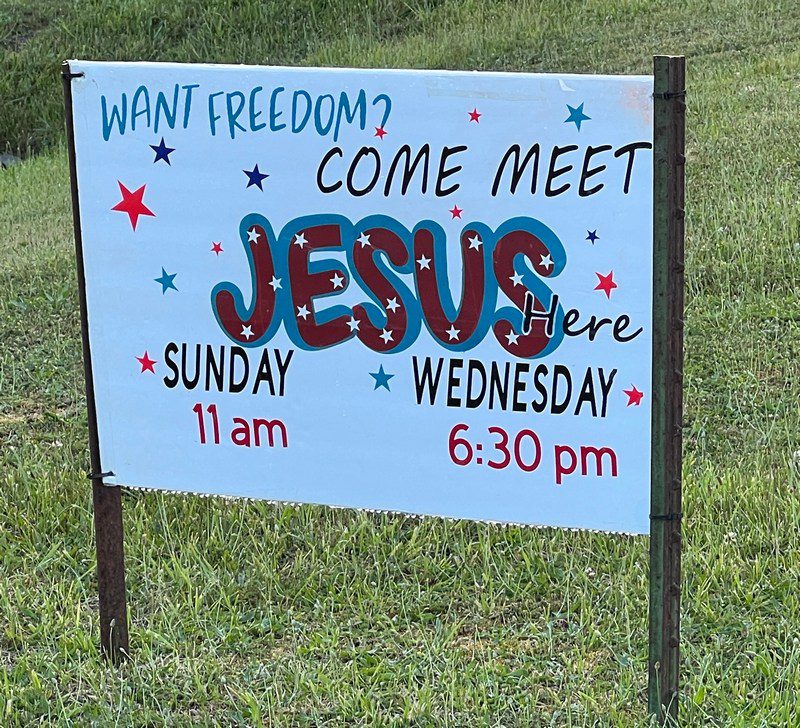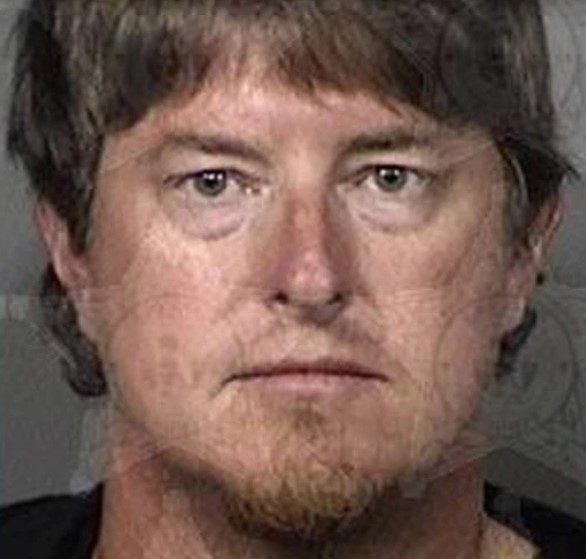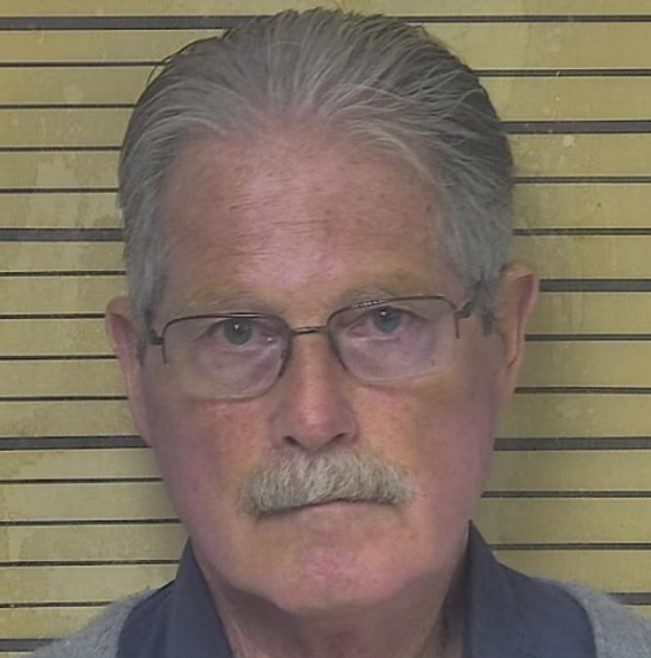
Warning! Trolley cars of snark ahead. You have been warned.
Several years ago, Charlie, a Trump-loving Independent Fundamentalist Baptist (IFB) preacher, sent me the following message on Facebook (all grammar in the original):
i only going to say one thing, and i wll never bother you again. God does exiist, and you need Jesus as your Savior. Hell also exists, and you are headed there. of course we are all entitled to our beliefs. So i will respect yours. and i hope you would respect mine. hope to see you in heaven one day.
Charlie was raised in the Independent Fundamentalist Baptist (IFB) church movement. Educated from elementary school through college in IFB institutions, Charlie is certain that his peculiar beliefs are right. Charlie attends Fellowship Baptist Church in Clayton, North Carolina.
What follows is my letter to Charlie:
Dear Charlie,
This is my response to the message you sent me on Facebook. I am only going to say these things once, and once said, I promise to never, ever contact you again. Not that I contacted you in the first place. For whatever reason, you took it upon yourself to contact me, thinking that your seven preachy sentences would somehow cause me to rethink my life, and hopefully lead me to repenting of my sins and asking Jesus to save me. I hate to break it to you, Charlie, I am already saved! Don’t you believe in once-saved-always-saved; the belief that once saved, a person can never lose his or her salvation? Well, I want to share some good news with you: I was gloriously born again at age fifteen and called to preach a few weeks later at Trinity Baptist Church in Findlay, Ohio. I spent the next thirty-five years devotedly following Jesus. Granted, I am now an atheist; but remember, once-saved-always-saved.
You say God exists, yet you provide me with no evidence for your claim. Should I just take your word for it? How do you know that your version of God is the true and living God? If I said to you that the true and living God was Loki, would you accept that without me providing evidence for my claim? Of course not. You could point to the natural world and say, SEE, GOD CREATED EVERYTHING! My reply is simple and direct, WHICH GOD? There’s nothing in nature itself that proves the Christian God is the creator of everything. Now, if you told me you were a deist, and your God set everything in motion and then said, “there ya go, do with it what you will,” I might at least listen to your claim. However, there is no evidence for the God of Evangelicals/Independent Baptists/Young Earth Creationists being the creator of the universe. Believing your God created everything is a faith claim. Even the Bible admits as much in Hebrews 11:1,3
Now faith is the substance of things hoped for, the evidence of things not seen.
….
Through faith we understand that the worlds were framed by the word of God, so that things which are seen were not made of things which do appear.
Did you read what the inspired, inerrant, infallible Word of God said, Charlie? “Through “faith” we understand that the worlds were framed by the word of God.” Believing the Christian God created everything requires “faith,” a faith I do not have. I am unwilling to “faith-it.” If you want me to believe in your deity, Charlie, you are going to have to prove his existence to me. If not, I will remain in unbelief.
You go on to tell me that I need Jesus as my Savior. Charlie, why do I need Jesus as my Savior? What is it that you think I need to be saved from? As I mentioned previously, I was saved at age fifteen. At age nineteen, I left home and enrolled at Midwestern Baptist College in Pontiac, Michigan to study for the ministry. While there, I married a beautiful IFB preacher’s daughter. Our marriage was saturated with Jesus 24-7 for thirty years.
Are you now saying that Jesus failed in some way when he saved me as a teenager? Jesus promised that he would never leave me nor forsake me, yet the extant evidence of my life suggests that Jesus has left the building and is never, ever coming back. I am beginning to wonder if Jesus is like Baal in 1 Kings 18. I am sure you remember the story. The Prophet Elijah challenged the prophets of Baal to a God-off. Whoever could call fire down from Heaven would be the winner. My favorite part of the story is when Elijah mocked Baal’s prophets, saying:
Cry aloud: for he is a god; either he is talking, or he is pursuing, or he is in a journey, or peradventure he sleepeth, and must be awaked.
Elijah said that Baal’s inaction was likely caused by him talking too much, taking a shit, being on vacation, or sleeping. Funny, that is exactly what I think about the Christian God. Wherever he is and whatever he is doing, one thing is for certain, he has no interest in helping people — well, outside of helping Granny Louise find her car keys. Look around, Charlie. Look at all the war, violence, suffering, hunger, disease, and death. If God is all that you say he is, why does he sit on the sidelines of the human experience and do nothing? My Gawd, man, your God couldn’t even protect children from sexual assault at your new pastor’s former church. If your God can’t protect innocent church children from IFB preachers/deacons/Sunday school teachers/evangelists/Christian school teachers preying on them, what good is he? (Please see the Black Collar Crime series.)
Your message to me goes on to say that Hell is real, and I am headed there. How do you KNOW Hell is real, Charlie? Can you take me there so I can see for myself? Supposedly, Hell is in the bowels of the earth. Don’t they have cell reception in Hell? I thought Verizon’s signal reached everywhere. Perhaps you can check this out for me. I would sure love to talk to my dear friend Steve Gupton, Christopher Hitchens, Madalyn Murray O’Hair, and Stephen Hawking. I want to know about the weather in Hell and make sure that they are taking care of my condo until I arrive. Oh wait, I am not going to Hell! Once saved, always saved, right? Ah, the absurdity of Evangelical theology.
You said one thing I agree with, “we are all entitled to our beliefs.” You, Charlie, are free to believe what you want. As a fellow evolving primate, I respect you as a person. Most of the people where I live think as you do. Life would be miserable for me if I didn’t respect my neighbors and try to get along with them. That said, when it comes to the beliefs themselves, I don’t respect your beliefs, and neither do you respect mine. Let’s put to rest the notion that we have to respect the beliefs of others, no matter how crazy those beliefs are. Sorry, but I can’t do that. Your beliefs are irrational and contradictory. (Please see The Michael Mock Rule: It Just Doesn’t Make Sense) Such beliefs cause all sorts of political, social, and personal harm. The psychological harm done by Evangelical beliefs and practices run deep, and the best thing that could happen is that Evangelicalism dies a quick death. While it is unlikely that I will live to see that day, I hope that one of my grandchildren will be there holding the pillow over Evangelicalism’s face as it draws its last breath.
You end your message with a passive-aggressive statement: “Hope to see you in heaven one day.” First, why do you think I won’t be in Heaven, Charlie? Remember, once-saved-always-saved. Even you can’t take away the salvation given to me by the triune God of Christianity. Second, you do realize that no one goes to Heaven or Hell when they die, right? I know you have been taught differently, but orthodox Christianity teaches that when people die their bodies go to the grave to await the resurrection of the dead — the resurrection of the just and unjust. Until that day, Heaven is populated with God, angels, and spirits. It’s only when Jesus returns to earth that all humans will be resurrected from the dead, judged, and then fitted with bodies suited for eternity in God’s eternal Kingdom (Heaven) or the Lake of Fire (Hell). When I die — and believe me, that’s going to happen sooner, and not later — my body will be cremated and my family will scatter my ashes along the eastern shore of Lake Michigan. There I will remain — intermixed with sand and lake water — until Jesus reanimates me and gives me a body that will withstand the whoop-ass he plans to put on me for eternity in Hell. That is unless, once-saved-always-saved, right?
Ask yourself this, Charlie, why would I want to spend eternity in Heaven with the likes of you? You see me as little more than a soul in need of saving. Imagine the praises that would come your way if you were instrumental in winning the infamous Evangelical-pastor-turned-atheist Bruce Gerencser back to Jesus? Man, when it comes to making the Soulwinning Top 100®, bagging me would surely be a Top Ten conversion!
Well, Charlie, you went for it and lost. Did you really think you could say anything that would cause me to reconsider my decision to divorce Jesus in November 2008? Did you read any of the posts listed on the WHY page? If you had read even a few of the posts on that page, you would have quickly learned that I am not a prospect for your supercalifragilisticexpialidocious IFB salvation. Been there, done that, remember?
I know you meant well, Charlie; that the Holy Spirit told you to message me; that you felt a momentary “burden” for Bruce Gerencser. I hope that the content of this letter will cause you to pause the next time you feel “led” to contact strangers on the Internet. That “feeling” you think is the “Holy Ghost,” is likely just the Taco Bell bean burrito you had for lunch.
Be well.
A sinner saved by reason,

P.S. I am kidding about all that once-saved-always-saved stuff. I have never believed I am still a Christian. You are required to believe I am because your soteriology demands it. However, people walk away from the Christian deity all the time. Scores of people do it every day. In my case, I once was a Christian, and now I am not. I am, according to the Bible, an apostate and reprobate. According to the book of Hebrews, I am beyond God’s saving grace. And I am okay with that. Life is good — without God.
Bruce Gerencser, 68, lives in rural Northwest Ohio with his wife of 47 years. He and his wife have six grown children and sixteen grandchildren. Bruce pastored Evangelical churches for twenty-five years in Ohio, Texas, and Michigan. Bruce left the ministry in 2005, and in 2008 he left Christianity. Bruce is now a humanist and an atheist.
Your comments are welcome and appreciated. All first-time comments are moderated. Please read the commenting rules before commenting.
You can email Bruce via the Contact Form.









